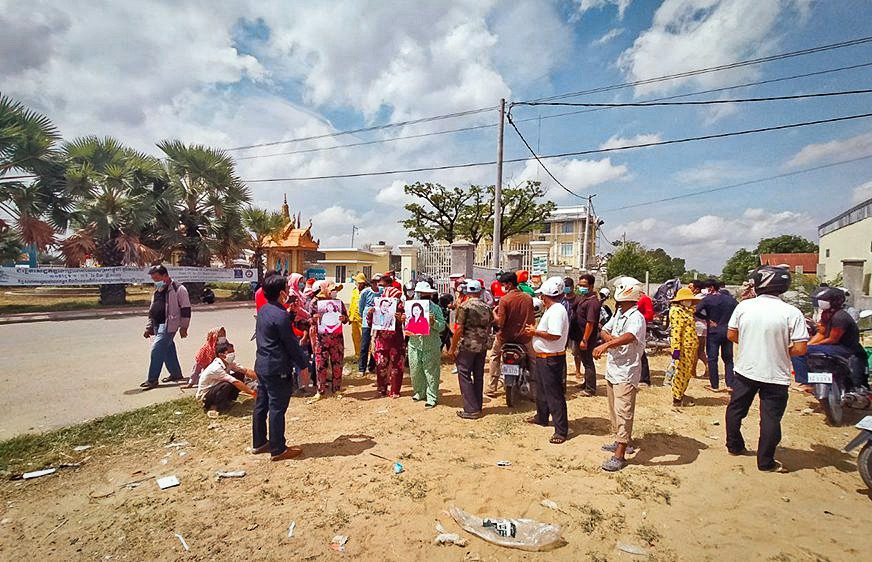This week marked another week of villager protests across the country asserting rights in land disputes that follow similar patterns of smallholders facing off with larger business interests.
In Koh Kong, provincial authorities have promised to find solutions by the end of March for families impacted by the UDG development project, potentially closing a conflict that has lasted for more than a decade. Elsewhere in Koh Kong, the provincial court is pressing on with the questioning of 10 community representatives charged with incitement amid a land dispute with tycoon Heng Huy.
To the north, people in both Phnom Penh and Ratanakiri province have continued their own dissent, respectively pushing for land compensation and accusing officials of conspiring to sell communal forest land.
Phnom Penh
In the capital, about 80 people who say they represent families living next to Boeung Tamok in Prek Pnov district, gathered this week in front of their district hall.
The representatives said the families own about 79 hectares of land next to the disappearing lake. However, they allege, the land claims of the 88 involved families have been dismissed by an unidentified company since late 2021. This company has reportedly offered no solutions for the displaced villagers, who say they have been cultivating the land since 1979.
A villager named Moang Sreynak said her family has worked on a 50-by-100-meter plot there, growing rice, artichokes and other crops since 1985. But now, she said the company has claimed all of the land and has begun parceling it off.
“They broke it into plots of land for selling and building apartments, and did not compensate,” Sreynak said. “Land we have relied on for more than 30 years is useless, so why does the company have the right to occupy and we don’t have rights?”
Ratanakiri
Far outside the capital, in Ratanakiri province, a community of Tompuon indigenous people in Lumpat district has accused local authorities of colluding to sell communal forest land to businesspeople. The indigenous villagers said about 20 hectares of the 100-hectare forest had been cleared for more than a month without prevention.
Kham Nin, a Tompuon villager living in the district’s Seda commune, said village and commune authorities were working together to sell the land.
“People do not dare to protest because the authorities colluded with each other,” Nin said.
Another indigenous villager, who asked not to be named for fear of his safety, said that machinery had been used to clear the land. Other locals are also worried for their safety after authorities threatened to sue them in court, he said.
The man appealed to upper-level authorities to investigate and take action against those public figures involved. He said he wanted to preserve the forest for future generations.
“Now, the mountains have gone, the land also has gone,” he said. “We have no forest to keep as a common asset for the community. I feel so regretful when seeing them clearing the land.”
Provincial environment department director Phon Khemrin said he has not gotten any information related to the clearing of forest land but will send his officials to inspect the situation.
“I will send officials to check whether it is the case and if it is the case, we will crack down and we will not let it happen,” Khemrin said.
Koh Kong
To the south, Koh Kong provincial authorities promised to find a solution for a land dispute between villagers and Chinese company Union Development Group by March 30.
But meanwhile, in another unrelated dispute, the provincial court continued questioning 10 representatives of villagers involved in a land dispute with a private company run by tycoon Heng Huy. The businessman had filed a complaint accusing the villagers of defamation and incitement to cause chaos.
According to the provincial administration’s statement on the UDG dispute dated March 18 and seen by VOD, a settlement for 1,300 families affected by the company’s project has been divided into three categories of grievances.
“If people of these three categories fail to accept the settlement by the time set, the national authority for land dispute resolution and the Koh Kong provincial administration will consider them to have abandoned their rights to receive a government settlement,” the statement read. “The national authority for land dispute resolution and Koh Kong provincial administration will not take responsibility for the loss of your benefits.”
Last September, the Koh Kong provincial administration announced its solution mechanism for the families, who are split between Botum Sakor and Kiri Sakor districts. The administration told the families involved to come take part in a lottery system to receive plots of land.
The first category includes 247 families who live inside the project location and may receive a half hectare of land for housing, 3 hectares for farming and $900. The second category includes 255 families who will each receive 2 hectares of farmland no matter how big a plot they formerly owned. The third and final group counts the 831 families who had previously received some settlement but pushed to receive more land and are now set to receive an additional 1 hectare each.
Saing Puy, a representative from Koh Sdech commune in Kiri Sakor district who opposes the settlements, told VOD that she has petitioned ministry offices several times but has yet to see a solution she deems fair.
“For those who don’t have land or have little land, they can accept the 2 hectares of land,” Puy said. “But those who owned at least 10 hectares, [they] cannot accept. It is so unfair.”
Elsewhere in Koh Kong, provincial court deputy prosecutor Vai Phirum summoned 10 representatives to testify in answer to the complaint of Heng Huy.
Det Huor, one of those summoned, told VOD on Wednesday the complaint was an unjust threat to prevent protests. Huor said the group represents 197 families and that people will not stop protesting. She also said the 10 representatives will go to testify as asked, as they have done nothing wrong.
“We were not afraid. We will still protest because people lost their land because Mr. Heng Huy encroached,” she said. “It is so unjust that our land was taken and we were also sued in court, I asked, is it fair for the poor people?”













